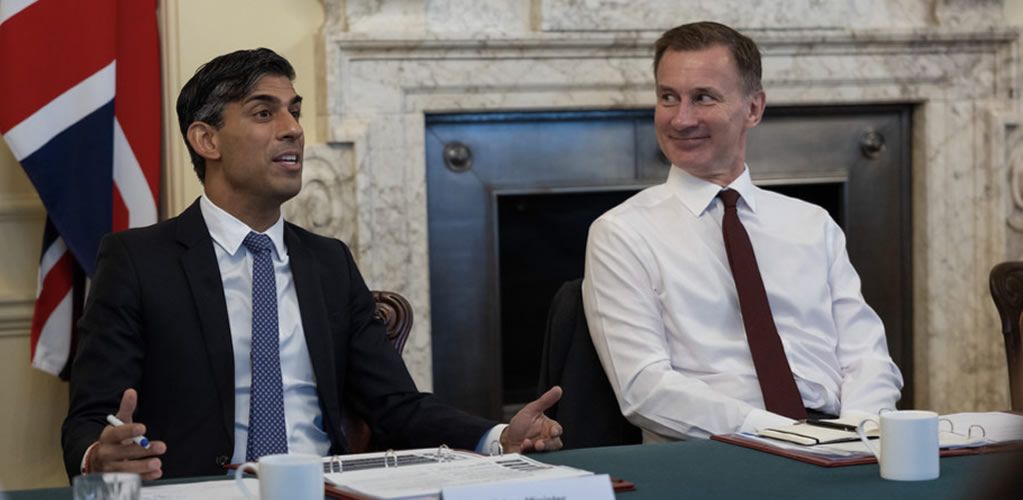Rising costs and delays don’t necessarily mean HS2 is failing
Economists do not have the analytical tools to properly measure the full value of a megaproject. Deciding on whether to pull the plug or not is always a political matter.

Economists do not have the analytical tools to properly measure the full value of a megaproject. Deciding on whether to pull the plug or not is always a political matter.
T he UK government is reportedly considering scrapping the second phase of its long-term high-speed rail project, HS2. It has been revealed that a cost analysis outlining the benefit of doing so was prepared ahead of Prime Minister Rishi Sunak’s recent meeting with Chancellor Jeremy Hunt.
Reports have said that Sunak and Hunt were told cancelling the line from Birmingham to Manchester could save up to £35 billion.
Launched in 2013, HS2 has been controversial from the outset. Support, both political and popular, has wavered. Costs and delays have spiralled, yet quantifying the corresponding increase in benefits has remained difficult.
We asked professor of new infrastructure development, Nuno Gil, from the Alliance Manchester Business School to explain how megaprojects come to be scrapped and what it means for the UK if phase two does not go ahead in full.

In 2020, then-PM Boris Johnson visited the HS2 Interchange Site, in Birmingham, when HS2 announced the creation of 22,000 jobs.
▫ Phase two of HS2 has reportedly already cost the government £2.3 billion. How is the value of such a megaproject calculated?
The western branch of HS2 phase two is in two sections: the line from Birmingham to Crewe and the extension from Crewe to Manchester. These recent reports pertain to the government potentially discontinuing the line from Crewe to Manchester – and we don’t have detailed information on why Sunak might do so.
Of course, we also lack detailed reasons for why the government cancelled the eastern branch of HS2 – from Birmingham to Leeds – back in 2021.
This matters. In the outline business case, it was precisely this Y-shaped configuration that was going to maximise the economic returns of the railway.
When the business case is made for a new infrastructure project, its value tends to be assessed by a mainstream cost-benefit analysis. This asks whether, once built, what people are willing to pay to use it will outweigh the costs of building it.
Yet, recently, this narrow definition of value has been refuted. And so has the idea that slippages in a project’s performance targets mean it is “failing”.
Beyond nominal economic returns, infrastructure projects should be seen as instruments of value distribution. They are tools for creating wider economic value, as well as social value (creating jobs, say, or stimulating the economy) and environmental value (for instance, achieving net zero and biodiversity targets).
The difficulty is these broader values are really hard, if not impossible, to quantify in money terms – they are quite subjective. And yet, as value gets distributed, slippages in targets become inevitable: costs soar, delays increase.
— HS2 Service Map —

This map shows the full HS2 network and how it will integrate with, and deliver services to, the existing rail network.
▫ Was HS2 not sold to the public as a tool for economic growth?
Initially, it was just a rail project, devised by Network Rail – before the financial crisis – to improve the country’s transport capacity. Over time though, as government negotiated the project with society, more and more stakeholder groups had their say. HS2 became a bit like a Christmas tree, with more and more baubles added to address the legitimate concerns raised by, say, environmental groups concerned about the impact on the Chilterns or businesses in Manchester concerned about the local economy.
As a result, the latest HS2 report lays out a much broader purpose where improving rail capacity and connectivity – the original goal – is but one of seven strategic goals. Other goals pertain to catalysing economic growth: benefiting the environment, creating social value, promoting health, safety and security and elevating customer experience. Goal six mentions delivering “value for money to the taxpayer”, but does not define value or how to measure it.
This broadening of the HS2 purpose legitimises spiralling costs and growing delays.
The question now is: has the world changed so much in the last decade that either those goals can no longer be achieved or that there’s a better way to achieve them – or is it that they are no longer a priority? And the trouble is that there is no consensus on how to answer that question. It therefore becomes a political one.

David Cameron is criticising the move to ditch HS2 to Manchester.
▫ Are megaprojects always political?
Yes, all big investments are judgement calls. The analytical tools to make a decision that is not political do not exist although policymakers may not say it.
A megaproject is essentially buying an option. When you start, you don’t know if it at some point, the world will change so much that you’ll have to stop. Sometimes you get it right, sometimes not. But you have to try.
In this instance, Manchester metro mayor Andy Burnham, among others, is understandably furious. To his mind, cancelling the second phase would suggest the government is reneging on its commitment to levelling up the country.
Others argue that the pandemic and the War in Ukraine, along with the concomitant deterioration of the country’s public finances, have changed things in such fundamental, and unforeseen, ways that phase two now should no longer go ahead in full.
▫ What would the consequences for the UK be if phase two of HS2 is scrapped?
First, it would undermine the construction industry, which is a strategic asset for the UK. Companies would lose trust in the government.
Second, pension funds, among others would take a hit, because the supply chain features heavily in many investment portfolios. This, too, would frustrate trust in the UK.
Third, it could impact the country’s reputation among international investors, an area where the UK is already not doing very well. Research consistently shows that a country’s physical infrastructure is a key determinant to attracting foreign direct investment and ensuring that it leads to growth. The UK’s highways are congested and its railways, outdated. What will the country have offer to the likes of Tesla, Intel and Toyota, by 2050? A Victorian infrastructure?
The real danger here is the government scrapping phase two in a knee-jerk reaction to national budgetary woes at best, or, at worst, political expediency ahead of the forthcoming election. We need leadership that puts the interests of taxpayers first.

GOING FURTHER
"Levelling up? My a***": Andy Burnham's reaction to reports Manchester leg of HS2 could be scrapped | Manchester Evening News
What is HS2? | HS2
Scrapping Manchester leg of HS2 holds political risks for Rishi Sunak | The Guardian
At last the truth - HS2 hits the end of the line | The Independent
Sources:
▪ Text: This piece was originally published in The Conversation and re-published in PMP Magazine on 25 September 2023. | The author writes in a personal capacity.
▪ Cover: Flickr/Number 10. (Licensed under a Creative Commons Attribution-ShareAlike 4.0 International License.)







[Read our Comments Guidelines]